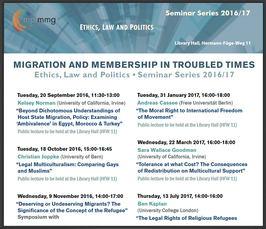"Beyond Dichotomous Understandings of Host State Migration Policy: Examining ‘Ambivalence’ in Egypt, Morocco & Turkey"
Migration and Membership in Troubled Times - Ethics, Law and Politics, Seminar Series 2016/17
- Datum: 20.09.2016
- Uhrzeit: 11:30 - 13:00
- Vortragende(r): Kelsey Norman (University of California, Irvine)
- Kelsey Norman is a doctoral candidate in the Department of Political Science at the University of California, Irvine. She specializes in Comparative Politics and International Relations and her research focuses on Middle East and North African states as countries of migrant and refugee settlement. Between 2012 and 2015 she conducted research in Egypt, Morocco and Turkey and has been affiliated with the Center for Migration and Refugee Studies at the American University in Cairo, the Arab-American Language Institute in Morocco, and the Center for Migration Research at Istanbul Bilgi University in Turkey. Her studies are supported by a Social Sciences and Humanities Research Council (SSHRC) of Canada doctoral fellowship, and she has current and forthcoming publications in the International Journal of Migration and Border Studies, Crossings: Journal of Migration & Culture, Égypte/Monde arabe, Refugee Review, The Postcolonialist, The Cairo Review of Global Affairs, Jadaliyya, Muftah, and The Washington Post’s Monkey Cage Blog.
- Ort: MPI-MMG, Hermann-Föge-Weg 11, Göttingen
- Raum: Library Hall

For more details please contact recke(at)mmg.mpg.de.
The majority of academic literature on migration and citizenship examines the phenomenon of movement from the Global South to the Global North. Since 2000, however, the migrant stock in the South has been growing more rapidly, and since 2013 nearly nine out of every ten refugees resides in a developing host state. Despite these changing migration patterns, there is a lack of information on how developing host countries choose to treat migrants and refugees (i.e. host state ‘engagement’). What determines developing host states’ policy toward newcomers? Under what conditions do states pursue a liberal strategy with access to residency, employment and services on par with citizens, or what drives them to treat migrants and refugees with exclusion? This paper argues that there is a third choice: ambivalence, namely that extant literature mistakes the absence of formal policy for neglect. This talk introduces a theoretical typology of engagement strategies that incorporates ambivalence, and uses data collected over two years in Egypt, Morocco and Turkey to examine and classify the engagement strategy pursued by each host state. Introducing ambivalence as a concept allows us to capture engagement that might otherwise be missed by traditional measures of host state policies, and allows us to understand the important transformations taking place in these increasingly significant migrant and refugee host countries.